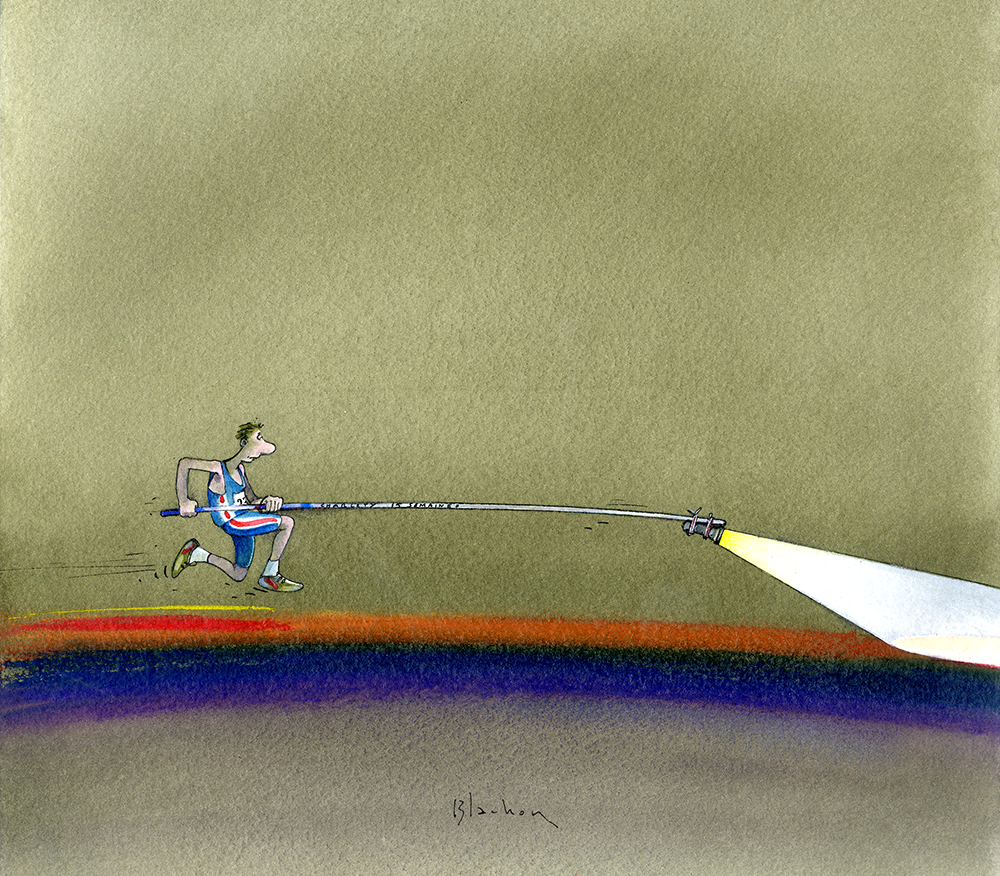

copyright:M. Blachon

WO: What have sports taught you? What lessons do you apply as leaders in your business, as members of a team, or in your personal lives?
Kuba: I’ve learned to live with stress. I started practicing sports at a very late age, so I always joined teams as a new member who had a lot to learn. When I learned and went through each stage, I moved on to stronger teams, and the story repeated itself. It was very stressful, I had to deal with this all on my own, learn to tackle the situation in my own way. I started off as a non-athlete, and after two years I was on the senior team level. It was never easy, and it was a really big deal. I learned that in a work environment there are figures of authority that you simply have to listen to. It’s obvious that you need to listen to the coach and believe what he says – it’s a basic rule to follow. I learned that every day you may hear critical words about yourself. The coach is not there to be pleasant – he is there to make things work better. It took me a while to handle criticism well, but I was used to the fact that every day I could hear something critical about myself, and I needed to draw conclusions from what was being said. The last thing I learned was that from the moment I became an athlete my day would no longer look like it did before – all my friends from high school were done with school at 2 p.m. and had lots of free time. My days were very different: school, practice, games that sometimes required travel – all this taught me to make full use of the whole day, every day. There is no such thing as 8-hour days on the job – you need to work as long as it takes to get everything done. Sometimes this means 8 a.m. till 8 p.m., sometimes 8 a.m. till 2 p.m.
Tomek: Sports gives you the confidence that makes you stand out. Sometimes genes help – for example, you’re tall and this makes you stand out at a business meeting. I owe my whole life to basketball. Two things influenced my career: knowing English, and basketball. Ever since I was a young boy my father took me skating, swimming, I played tennis, but it was basketball that stole my heart from day one. I started practicing and playing right away. I also stood out in school. Athletes are usually well-liked, so if you play sports in grade school, then high school, you win games for the school, people like and admire you, you become popular. You practice a lot so you look good and you’re popular with the girls. All this builds confidence, it’s great. You also learn to have respect for objects, because sports equipment is expensive. You appreciate the fact that your mother takes you to a store and buys you expensive sports shoes – they cost half her monthly salary, and so you take good care of them.
Szymon: First of all sports taught me cooperation – team sports in particular teach this, and I’ve been playing volleyball all my life. Second of all – sports teach punctuality. Every time someone was late for practice or for a local game he got a series of penalty throws. If the team was traveling to a game and someone was late, the coach left without them. So, if someone was late once, they learned the consequences and were never late again. Another thing – although I am not sure whether this is key – I learned personal hygiene. Some people are taught this at home, others aren’t. Some players didn’t take showers after practice. They got one warning – they were told “next time, please bring a towel”. If they didn’t, they had to take a shower in their clothes, so they learned. So in general – yes, playing sports teaches many things.
WO: What does it mean when people say that practicing sports “teaches” something?
Szymon: Playing sports teaches discipline, humility, and from a very early age it teaches you how to win and lose. When I started playing at age 13 I learned that when you lose you can’t break down, you need to get up and go on, get back to practicing and keep working.
WO: Each one of you was more or less a professional athlete at some point, and one of the basic questions I ask myself in business is what causes someone to want to go on? So what drove you to want more?
Szymon: There is one thing my wife doesn’t understand to this day – the concept of competition and wanting to win, which drove me from the start. I finished my career as a professional athlete and moved on to non-professional sports but still, whenever I am on the playfield, I want to win. My wife still doesn’t understand that I want to get up at 7.00 a.m. on a Saturday, because I have a game at 9.00 a.m. and I need to get there on time, play and win. I want to win!
Kuba: Rivalry, competition. From the first we competed with each other: one on one, three on three, five on five. When you run you compete with yourself. Athletes that have had big, successful careers usually go on to compete in casinos. Playing even in the amateur league is much better than playing in a casino, with our salaries…
Tomek: When I was a young player I used to think that I would play on the highest level, so in the NBA, I was sure this was going to happen. In the end it didn’t, but I work quite closely with the NBA, which gives me a lot of satisfaction, and also means I still move around, I feel like I have done something, made a change. I come back from practice and say „Things are good, I did some running, and nothing bad happened”. I spent my time well, my outlook on life has changed. Competing makes you feel like you are doing something good for yourself.
Michał: We felt this and now I see other players in our school feel the same thing. When our students are sick, parents call and excuse their absence, but if there is a game the following day the students show up no matter what. This sense of competition, the possibility of watching a game even from the bleachers, makes them want to go on. Practicing without the possibility of playing, of competing, would not be the same…
WO: So passion is not everything, it’s also the pleasure of winning and the drive to win that make you get up early and play.
Kuba: You need to have character for this. People who fear competition don’t go into sports.
WO: What is the role of sports in organizing life as a whole?
Szymon: It’s a very important role because sports helps organize life both for the young and the older players, who have learnt what sports give us. Without the values you learn through sports – for example, the regularity of getting up at 7 a.m. for practice – you can’t do well in adult life, when you need to get up for work in the morning. I think if you learn the basics of humility in junior-level sports it’s a lot easier to succeed in sports at a more senior level.
We spoke as a team:
Michał Feter – principal of the Gortat School in Łódź for the last 4 years. Previously, for 10 years Michał worked as a coach and management advisor (including project management), and was responsible for obtaining outside funding for projects, evaluation, and coach competencies. He is the author of over 200 grant projects. From an early age he has been fascinated by sports. Spain is his hobby.
Szymon Nowak – occupational therapist, teacher and publicist by education, who has been active in volleyball all his life. He loves working with people and for the people. Before joining the Gortat School he worked for the Dziewczynka z Zapałkami and JiM Foundations. At the School he is responsible for marketing and for the growth of the volleyball project. Coordinator of the Gortat School Business Club. He does what he loves by working in the field of sports.
Tomasz Solarek – graduated from Łódź University with a degree in English. Used to play basketball for ŁKS and Łódź University. Worked for 7 years for the Marcin Gortat MG13 Foundation, where he was responsible for coordinating the Marcin Gortat Camp project. Currently works for the Gortat School and Gortat School Business Club. Responsible for collaboration with American colleges to provide sports scholarships in the U.S.A. for Gortat School students.
Jakub Urbanowicz – graduated from the Łódź University of Technology with a degree in Management. Used to play basketball for ŁKS and and the Łódź University of Technology. Responsible for the development of Marcin Gortat Schools in Łódź, Kraków, Poznań, and Gdańsk. Co-creator of the Gortat School Business Club. President of the ŁKS Male Basketball Association.
Waldek Olbryk – Believer in the development of organizational culture through working on aspects that can influence it, based on the client and user perspective. Believes in the concept of “life-long learning”. Loves the P2P (people2people) approach in everything that is related to business – even in the area of pure B2B (business2business). Open to exchanges between cultures and sectors. Created the concept and co-organized discussions between artists, businessmen, and academics organized at the SOUNDEDIT 2017 festival in Łódź. Admitted to the Royal Society for the Arts, Manufactures and Commerce in 2018. Currently works as Board Member of Echo Investment S.A. For over 20 years he has been active in the real estate sector in Poland, working for companies such as BP, Apsys, Philips, and Skanska.
Look for others inspirations, interviews? Go for p2v